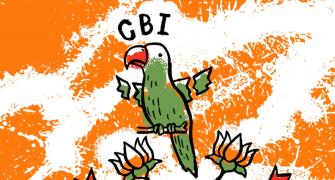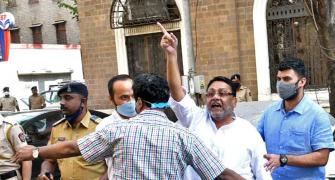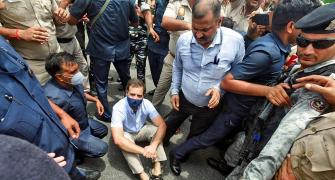Investigation agencies cannot act according to their whims and fancies and courts have ample power to check any misuse or abuse of powers by them, a Delhi court has said.

The court also said that it had the power to supervise and monitor an investigation to ensure its fairness and impartiality and senior police officers were expected to improve the investigation mechanism instead of 'justifying manifestly improper conduct of investigating officers'.
'The investigation agencies cannot act as per their whims and fancies and the courts have ample power to check the misuse or abuse of powers by the investigation agencies,' the court said in its recent order.
Additional Sessions Judge Atul Krishna Agrawal made the observations while hearing the anticipatory bail plea of Faheem, against whom the Delhi Police had registered a first information report (FIR) for various offences, including theft, sexual assault and criminal intimidation.
According to the police, the accused was allegedly one of the associates of the main accused, Mehfooz, and purportedly trespassed into the complainant's jhuggi and committed theft and sexually harassed his wife.
The court noted that the main accused, Mehfooz, was already granted bail in the case and the case against the accused was of lesser magnitude.
It further noted that the present investigating officer (IO) could not produce any further evidence which could substantiate the allegations made against Faheem in the FIR.
'...since the statement of the wife of complainant...has already been recorded, no purpose would be served in sending the accused to custody for this reason alone as no custodial interrogation is required for the same,' the court noted while granting him the relief.
The court, however, noted that another court in an order in May 2022 observed that prima facie the attempt of both the complainant and the accused appeared to be a case of laying claim over a public land on various pretexts.
It also noted the earlier court's observation that it was possibly a case of dispute between two gangs of land mafia, who are allegedly involved in grabbing and sale of illegally constructed buildings built upon encroaching government land.
The judge said that the earlier court had directed that a copy of the order be sent to the joint commissioner of police, with the observation that, if necessary, it would be open to the police to seek the assistance of the specialised agencies in order to confirm background and credentials of the complainant, witnesses and others with regard to the possibility of land grabbing.
The additional deputy commissioner of police has subsequently sought time from the predecessor court to ensure that appropriate communications and action were taken by the agency concerned, the court noted.
The deputy commissioner of police had later told the predecessor court, "In light of the observation made by the court, a decision related to the transfer of investigation in the matter to some specialised agency dealing with land grabbing matters appears to be necessary but a decision regarding the same can only be taken at the level of higher authority."
But after August 5 last year, no further communication was received from the DCP and the present court sought a report from the police officer on November 29 last year, the additional sessions judge noted.
It further said that another DCP, however, submitted a report in December, saying the present case was examined on merits and it was found to be devoid of seeking intervention from any specialised agency.
The report of the DCP also said that the investigation was not transferred as it was the 'prerogative' of the investigating agency, the court noted.
'Normally such a report would have been made part of the record without any comments on the same, however, this court is constrained to make certain observations in view of the above report of DCP as it is based on wrong premises besides being evasive in nature,' the court said.
It said timely reports were not filed before the predecessor court and that it was 'kept in dark'.
'What to talk of the IO, even a police officer ranked as high as Additional DCP gave an assurance to the court that he will communicate to the court about the decision taken by his senior police officers regarding the investigation to be done by a specialised agency...but did not do so,' the court said.
The court said even on later dates, the information was not given to the court and this showed the 'callous attitude' of the senior police officers.
Taking umbrage to the remark of the Additional DCP that the investigation was the prerogative of the investigating agency, the court said even if it was the agency's prerogative, the IO as well as his senior officers including the DCP and higher police officers should keep in mind that this discretion was 'not absolute'.
'Hence for the present DCP to say that the investigation being prerogative of the investigation agency was an uncalled for remark and should have been avoided. DCP should have made herself well aware of the facts, beforehand,' the court said.
'Hence, it is expected that the energy of senior police officers is better spent in improving the investigation mechanism instead of justifying manifestly improper conduct of investigating officers,' the court said.










